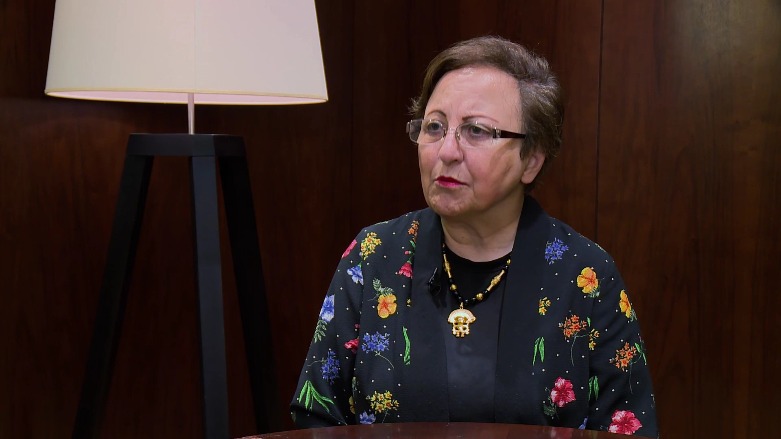Shirin Ebadi hopes for peaceful activism of Kurdish parties opposing Iran

The first Iranian to be awarded the Nobel Peace Prize, Shirin Ebadi is a human rights activist, lawyer, and former judge. Listed by Forbes magazine as one of the "100 most powerful women in the world" in 2004, she is currently in exile from her native country.
On Sunday, she sat down with Kurdistan 24 to discuss the latest developments in Iran, which this, the second of a two-part article, will cover.
ERBIL (Kurdistan 24) – Iranian Kurdish (Rojhilati) parties should resort to a “peaceful” solution to combat Tehran, Shirin Ebadi said during an interview with Kurdistan 24, in their struggle to acquire more rights, in comparison to Persians whom, she stated, enjoy more rights than other ethnicities in the country.
“The people of Iran are deprived of many of their rights, and this deprivation is more prevalent in the Kurdish regions.”
One of the ways in which the Kurds are persecuted, she explained, is that “they do not have the right to study in their language, even though the [Iranian] constitution recognizes the people.”
“It has been forty years since the constitution was approved, and still, the government has not implemented it,” she stressed.
Here, Ebadi points to Article 15 of the Iranian Constitution, which begins with “Persian is the official and common language and script of the people of Iran. The documents, correspondence, official texts, and schoolbooks must all be in this language and script.”
However, “use of regional and ethnic languages in the press, the mass media, and the teaching of their literature at schools, alongside the Persian language, is freely permitted,” Article 15 concludes.
She then highlighted another tough reality some Kurds experience, notably those who live in areas that border the Kurdistan Region of Iraq, which is limited employment opportunities and the need to resort to smuggling activities between the two countries to earn a living.
These individuals are known as Kulbars, individuals who manually transport goods across the border. Every day, local rights organizations report injuries and deaths that occur from the dangerous work, with Kulbars falling as they cross the harsh mountainous terrain, stepping on landmines, and coming under fire by Iranian border guards.
Though illegal by the country’s laws, for some, it is the only source of income in the economically-undeveloped areas.
“Let’s assume that the practice is illegal, does that mean that you [Tehran] are supposed to jail and take them to a court of law or kill them on the spot?” Ebadi challenged.
“This kind of behavior toward the Kurds has led to an even greater level of discontent toward the government, at times inspiring even more radical measures than protests,” she added.
After decades of tribal uprisings in Iran, Kurds began an independence movement after the Second World War and rebellions, first against the monarchy and later, against the Islamic Regime. One particular battle led to the death of some 10,000 Kurds and the displacement of 200,000 more in 1979, after the Islamic revolution, between the new regime and the Kurdistan Democratic Party of Iran (PDKI) and Komala.
From then on, until 1996, both sides carried out dozens of operations against each other, killing hundreds. In 1996, the Kurdish parties moved toward political activism as opposition, with headquarters in the Kurdistan Region. However, the parties resumed their insurgency operations inside Iran in recent years.
In response to the uptick in clashes within Iran, Tehran struck the headquarters of PDKI and Kurdistan Democratic Party of Iran (KDP-I), old allies, on Sep. 08 when the KDP-I leadership was holding a meeting. The Iranian Islamic Revolutionary Guard Corps (IRGC) claimed to have used seven domestically-produced missiles in the attack, which resulted in the death of 15 people and injury of 42 more.
Ebadi asserted that striking the parties “in another country [Iraq]” was “a violation of international law,” underlining it was not the first time the Islamic republic “commit such crimes” against Rojhilatis in Iraq.
“And we saw,” Ebadi continued, that “the Kurds went on strike for a whole day [on Wednesday],” after the attack.
Regarding the response of Iraq to the incident, Ebadi described the Foreign Minister’s statement as “superficial,” adding that, “after the fall of Saddam Hussein, the influence of Iran in Iraq is very strong,” and that Baghdad is “now a very close ally” of Tehran.
Another reason Rojhilatis went on strike on Wednesday was the execution of three Kurdish activists: cousins Zaniar and Loghman Moradi, and Ramin Hossein Panahi, whom Ebadi stated “were denied a fair trial,” after expressing her condolences for the families of the victims.
As a human rights activist, she keeps a record of the executions Iran carries out and pointed out that “over 90 percent of executions are from minority communities, meaning they are either Balochis, Kurds, or Arabs.”
Rightfully, she said, these “acts of violence” will only lead to more unrest. “If Iran’s approach to its minorities, the Kurds especially, was better, we would see a more peaceful Kurdistan [Rojhilat].”
Reiterating her condolences and support for Rojhilatis, Ebadi pleaded, “do not turn to violence. I beg you to continue expressing your demands and resisting, but do so peacefully.”
“If you turn to aggression, you give the government an excuse to suppress you even more. Come and work together with civil and peaceful resistance movements to force [Iran] to respect the rights of all its people, including the Kurds.”
On her history as an activist and steps she continues to take in defending human rights, she told Kurdistan 24 that during her time in Iran, and with the aid of fellow lawyers, they established “Defenders of Human Rights Center” through which they “defend, for free, persons detained on charges of political [activism].”
“I hope that one day, in an Iran that is democratic and where the conditions of people are better, we can live peacefully,” Ebadi concluded.
Editing by Nadia Riva
